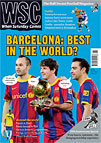 Thanks to share rules, German fans retain a say in the running of their clubs. But Paul Joyce worries this may be about to change
Thanks to share rules, German fans retain a say in the running of their clubs. But Paul Joyce worries this may be about to change
German football is justifiably proud of its strict regulations on club ownership. In order to prevent predatory investors seizing control of teams, the statutes of the German Football League (DFL) decree that at least 50 per cent of a professional club’s shares plus one controlling vote must be owned by its members, ie the supporters. This democratic model also means that fans of teams such as Schalke 04 and 1.FC Cologne have recently been able to use their clubs’ AGMs to block unpopular measures proposed by their boards.
Yet, in reality, outside interference in sporting affairs is increasing. “Anyone who thinks that everyday decisions in the Bundesliga are taken by the classic organisational structure of presidents and managers is dreaming,” stated sports lawyer Christoph Schickhardt in January. “They are taken by banks, investors and creditors.”
Nowhere is this more apparent than in a village of 3,300 inhabitants in south-west Germany. Since 1990, Dietmar Hopp, the billionaire founder of software company SAP, has ploughed €237 million (£209m) into minnows TSG 1899 Hoffenheim, taking his local team from non-League obscurity to the top of the Bundesliga in 2008. As much of this investment has been in infrastructure and youth development, the football authorities have been full of praise. “Hopp is using his hard-earned money to do in his region what we would like to do throughout Germany,” enthused Theo Zwanziger, president of the German Football Association (DFB).
But although Hopp adheres to the 50+1 rule by only owning 49 per cent of the club’s shares, he is responsible for 96 per cent of its ordinary share capital, which has led other clubs to claim that he exerts excessive influence on 1899’s affairs. “He’s quite clearly the CEO in Hoffenheim,” claimed Hans-Joachim Watzke, chief executive of Borussia Dortmund. “To be honest, I don’t even know their actual president’s name.”
Matters came to a head in December when it emerged that Hopp had played a key role in the transfer negotiations which saw Hoffenheim midfielder Luiz Gustavo join Bayern Munich for €15m. Coach Ralf Rangnick, who had guided the club to the top flight, was not informed of the sale and resigned. Although a subsequent DFB inquiry found Hoffenheim not guilty of malpractice, many felt that the spirit, if not the letter, of the law had been breached.
The Gustavo affair gave Martin Kind, president of Hannover 96, the chance to repeat his claims that the 50+1 regulation was now so porous as to be unworkable. “Anywhere where a club has its back to the wall or where there is a model like the one in Hoffenheim, the rule will be circumvented,” Kind argued. Instead, he has proposed a consensus model whereby private investors could buy overall control of clubs but must commit themselves for a minimum of ten years and be subject to DFL scrutiny.
Kind made his first attempt to get the regulation repealed in November 2009, but was outvoted by Germany’s other 35 professional clubs. Undeterred, he has launched an appeal with the DFB and DFL’s arbitration tribunal, whose decision is expected by June. “The action is based on four legal issues,” Kind explained. “One of them is competition law in German football. There are two exceptions, in Wolfsburg and Leverkusen, where the 50+1 rule doesn’t apply.” When the regulation was introduced in 1999, companies that had financially supported clubs for over 20 years received exemption, which allowed Volkswagen and Bayer to retain 100 per cent control of VfL Wolfsburg and Bayer Leverkusen respectively.
If Kind’s appeal is unsuccessful, he plans to take his case to the European Court of Justice, where the 50+1 regulation is likely to be ruled unlawful. Germany’s club ownership restrictions could well be strengthened, however, by UEFA’s Financial Fair Play initiative which will require clubs to break even without subsidies from rich sugar daddies, or else be excluded from international competition. The sale of Gustavo was Hopp’s first step in making Hoffenheim financially independent before he withdraws his support in 2014-15.
But if the UEFA initiative merely reinforces the dominance of Europe’s established clubs by making it harder for smaller teams to attract investors, then Kind seems unlikely to be appeased. “Objectively speaking, Financial Fair Play is to be welcomed, but it mustn’t stifle all creativity,” he warned in February. Support for Kind’s proposals remains muted. Bayern Munich, in which Adidas and Audi hold nine per cent stakes, suggested in December that they might introduce their own “70+1” rule which would mean that at least 70 per cent of shares would remain in supporters’ hands.
With clubs such as Schalke 04 sliding further into debt in an attempt to stay internationally competitive, it is unclear how long the status quo can last. Christian Seifert, chief executive of the DFL, warned German clubs in January that jettisoning the 50+1 rule could have “fatal consequences”. Seifert argued that clubs would not be interested in a Bundesliga whose competition was “distorted” and “devalued” by “dubious financial backers” to whom teams might turn in desperate circumstances.
West Ham midfielder Thomas Hitzlsperger described Hopp as personifying a transition phase in German football in which the 50+1 rule may well disappear. He reassured supporters, however, that the English model wasn’t so bad after all. “I’ve noticed in England that the investors haven’t harmed the good atmosphere,” he said. “The fans want success and the best players at all costs. If good football is played, then suddenly everyone’s happy.” And if a comparison with the Premier League doesn’t show German clubs why the 50+1 rule needs to be defended at all costs, then nothing will.
From WSC 292 June 2011